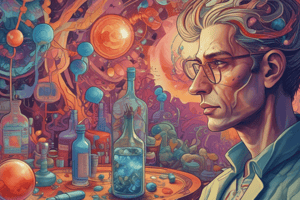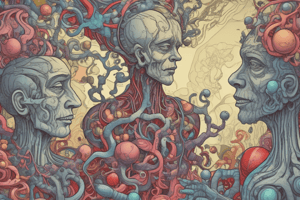Podcast
Questions and Answers
Which of the following is classified as an antagonist?
Which of the following is classified as an antagonist?
- Mescaline, because it floods the brain with dopamine.
- A tricyclic antidepressant, because they block serotonin and norepinephrine transporters. (correct)
- An amphetamine, because they lead to increased central nervous system activity.
- Prozac®, because it blocks the reuptake of serotonin.
- Cocaine, because it floods the brain with dopamine.
A drug that has the effect of intensifying or mimicking a particular neurotransmitter can be characterized as...
A drug that has the effect of intensifying or mimicking a particular neurotransmitter can be characterized as...
- A reuptake inhibitor, because it increases activity of the central nervous system.
- An agonist, because it intensifies the effects of a particular neurotransmitter. (correct)
- A hallucinogen, because it has the reverse effect of an agonist.
- A stimulant, because it increases activity of the central nervous system.
- An antagonist, because it intensifies the effects of a particular neurotransmitter.
The drugs that block the reabsorption of neurotransmitters in the synapse during neural transmission are...
The drugs that block the reabsorption of neurotransmitters in the synapse during neural transmission are...
- Benzodiazepines
- SSRIs (correct)
- Stimulants
- Antipsychotics
- Antihistamines
The process by which neurotransmitters are reabsorbed into the neuron after it fires is called...
The process by which neurotransmitters are reabsorbed into the neuron after it fires is called...
Brain lateralization refers to the...
Brain lateralization refers to the...
The person most strongly associated with identifying deficits in the motor speech area and in the ability to produce speech is...
The person most strongly associated with identifying deficits in the motor speech area and in the ability to produce speech is...
Which of the following is true about the pons?
Which of the following is true about the pons?
Based on its effects on the central nervous system, alcohol can be classified as...
Based on its effects on the central nervous system, alcohol can be classified as...
Lucid dreaming occurs when people...
Lucid dreaming occurs when people...
Getting a headache from not having a morning coffee after substantial daily coffee consumption for several months is most likely due to...
Getting a headache from not having a morning coffee after substantial daily coffee consumption for several months is most likely due to...
Flashcards are hidden until you start studying
Study Notes
Pharmacological Terms
- Antagonists block receptors in the brain; for example, tricyclic antidepressants block serotonin and norepinephrine transporters.
- Agonists mimic or enhance the effects of neurotransmitters; relevant example: drugs that amplify neurotransmitter activity.
Reuptake and Neurotransmitters
- Selective serotonin reuptake inhibitors (SSRIs) block the reabsorption of serotonin, increasing its availability in the synapse.
- Reuptake is the process where neurotransmitters are reabsorbed into the neuron after being released.
Brain Function and Structure
- Brain lateralization indicates that certain cognitive processes may be specialized to one hemisphere, reflecting brain functional specialization.
- Paul Broca identified speech production deficits, leading to the term Broca's aphasia, connecting lesion location in the left frontal cortex to speech difficulties.
Brain Regions and Functions
- The pons plays a dual role in regulating sleep and arousal while serving as a bridge between brain hemispheres.
- Alcohol, classified as a depressant, has a calming effect on the central nervous system, contrasting with stimulants that increase activity.
Sleep and Dreaming
- Lucid dreaming allows individuals to recognize they are dreaming, enhancing dream awareness.
- Withdrawal symptoms, such as headaches from caffeine, arise when a dependent user abstains from a substance after prolonged use, highlighting the body's adaptation to the drug.
Additional Concepts
- Tolerance develops when a user requires more of a substance to achieve the same effect due to repeated use, illustrating the body's adjustment to drugs.
- Dependence occurs when physiological or psychological symptoms manifest upon cessation of a drug, reflecting a deeper interaction with the body's chemistry.
Studying That Suits You
Use AI to generate personalized quizzes and flashcards to suit your learning preferences.




